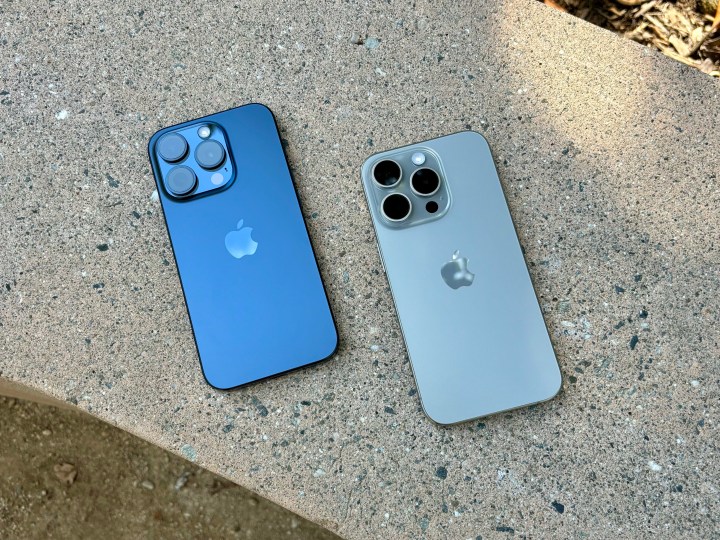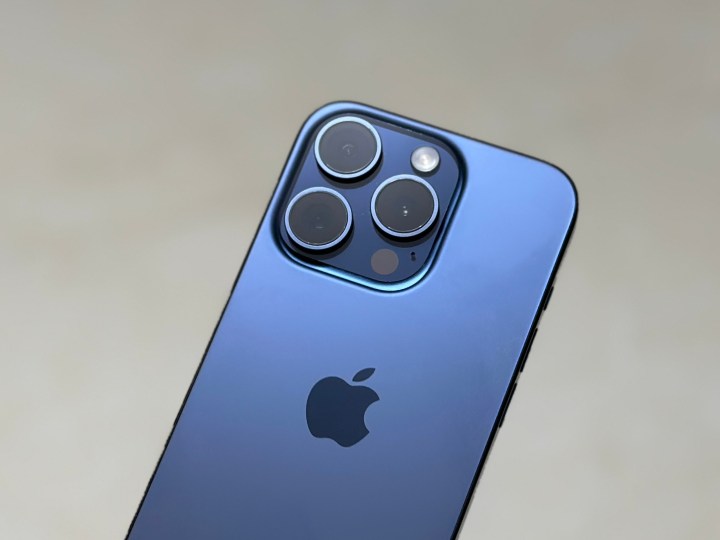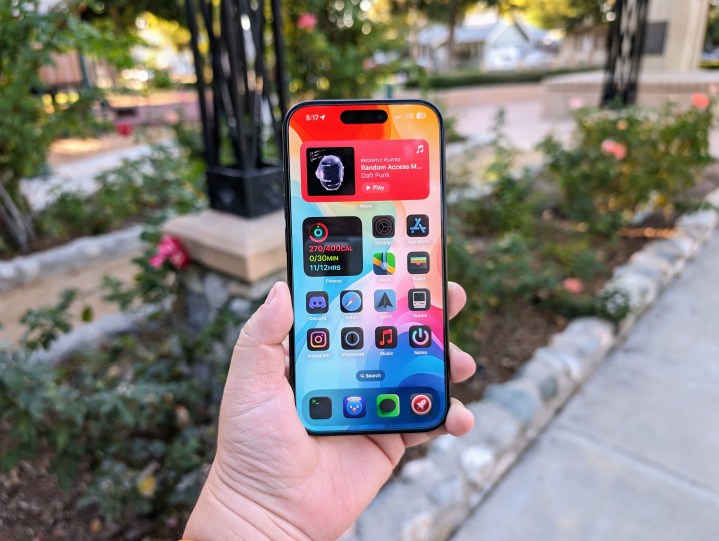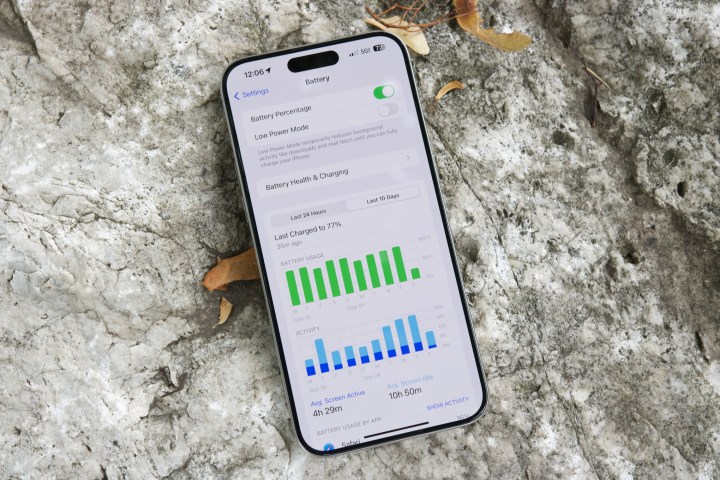Google has just unveiled the next generation of Pixel devices with the Pixel 9 series. This lineup now has four phones, similar to Apple’s own iPhone lin. They are the Google Pixel 9, Pixel 9 Pro, Pixel 9 Pro XL, and Pixel 9 Pro Fold.
Now that Google has brought back the XL version, the Pixel 9 Pro is a smaller version of the Pro flagship. So how does it compare to Apple’s own device of a similar nature, the Apple iPhone 15 Pro? Let’s take a look.
Google Pixel 9 Pro vs. iPhone 15 Pro: specs
| Google Pixel 9 Pro | Apple iPhone 15 Pro | |
| Dimensions | 152.8 x 72 x 8.5 mm
6 x 2.8 x 0.3 inches |
146.6 x 70.6 x 8.25 mm
5.77 x 2.78 x 0.32 inches |
| Weight | 199 grams
7 ounces |
187 grams
6.60 ounces |
| Display | 6.3-inch Super Actua LTPO OLED display
1280 x 2856 resolution at 495 ppi 120Hz refresh rate 2000 nits (HDR)/3000 nits (peak) |
6.1-inch Super Retina XDR OLED display
2556 by 1179 resolution at 460 ppi 120Hz refresh rate 1600 nits (HDR)/2000 nits (peak) |
| Durability | Corning Gorilla Glass Victus 2
IP68 |
Ceramic Shield
IP68 |
| Colors | Rose Quartz
Hazel Obsidian Porcelain |
Black Titanium
White Titanium Blue Titanium Natural Titanium |
| Processor | Google Tensor G4 | Apple A17 Pro |
| RAM | 16GB | 8GB |
| Storage | 128GB
256GB 512GB 1TB |
128GB
256GB 512GB 1TB |
| Software | Android 14 | iOS 17 |
| Updates | Seven years of OS, Feature Drops, and security updates | At least five years or more |
| Rear cameras | 50-megapixel main, f/1.68, 82-degree FOV
48MP ultrawide, f/1.7, 123-degree FOV 48MP telephoto with 5x optical zoom, f/2.8, 22-degree FOV |
48MP main, f/1.78
12MP ultrawide, f/2.2 12MP telephoto with 3x optical zoom, f/2.8 |
| Front camera | 42MP with autofocus
f/2.2 aperture 103-degree ultrawide FOV |
12MP TrueDepth camera
f/1.9 aperture |
| Battery | 4,700mAh | 3,274mAh |
| Charging | 30W fast charging (50% in 30 minutes)
23W fast wireless charging Reverse wireless |
30W fast charging (50% in 30 minutes)
15W wireless charging 4.5W reverse wireless |
| Price | Starts at $999 | Starts at $999 |
Google Pixel 9 Pro vs. iPhone 15 Pro: design and display

Google took a page from Apple this year regarding some elements of the Pixel 9 lineup’s design. It seems that ever since Apple went with the flat edges with the iPhone 12, a lot of competitors have followed suit, including Google.
The Pixel 9 Pro now features flattened edges on the frame, just like the iPhone 15 Pro. However, the corners are more rounded on the Pixel 9 Pro. The Google phone also has a revamped camera bar from previous generations, which is now an elongated capsule that houses a triple lens camera system. Rather than extending into the edges of the frame, the new camera bar ends just short of the edges.
For the Pixel 9 Pro, Google went with a glossy frame, which does give it a more “premium” look, but is also more prone to fingerprints and smudges. The back glass has a matte finish, however, which should reduce the amount of smudges and fingerprints. The Pixel 9 Pro uses Corning Gorilla Glass Victus 2 for improved durability.
The Pixel 9 Pro is available in four colors: Rose Quartz, Hazel, Obsidian, and Porcelain.

The design of the iPhone 15 Pro is similar to previous years, but Apple did make some nice changes. The iPhone 15 Pro switched to a titanium frame instead of stainless steel, making the device a bit more lightweight. The titanium frame also has a brushed metal look, rather than polished. The edges are still flat, the back glass is a matte finish, and the camera module remains unchanged.
For the front glass, Apple uses its proprietary Ceramic Shield. For the entire iPhone 15 lineup, Apple switched over to USB-C from Lightning, making the iPhone 15 Pro one of the first iPhones with USB-C, Apple also switched out the silent/ring toggle for the brand new Action button, which is exclusively on the Pro models.
As far as displays, the Google Pixel 9 Pro has a 6.3-inch Super Actua LTPO OLED panel that features thinner and more uniform bezels than its predecessor. It has a resolution of 1280 x 2856 at 495 pixels per inch (ppi) and a dynamic refresh rate between 1Hz and120Hz. In terms of brightness, it can reach up to 2000 nits for HDR content and 3000 nits peak brightness. It has a small hole-punch cutout for the front-facing camera.
The iPhone 15 Pro sports a 6.1-inch Super Retina XDR OLED display with 2556 x 1179 resolution at 460 ppi. It uses Apple’s ProMotion display technology with a 120Hz refresh rate for smooth scrolling. In terms of brightness, it’s typically 1,000 nits, 1,600 nits for HDR content, and 2,000 nits peak. Apple introduced the new Dynamic Island on the iPhone 15 Pro, which changes size and shape depending on content, and also hides the front-facing TrueDepth camera.
The iPhone 15 has four color options to pick from: Blue Titanium, Natural Titanium, Black Titanium, and White Titanium.
Winner: Tie
Google Pixel 9 Pro vs. iPhone 15 Pro: cameras

If you want a smartphone with a great camera, both of these have some pretty impressive specs, but one definitely edges out the other.
The Pixel 9 Pro has a triple camera system on that revised camera module. It sports a 50-megapixel Octa PD wide camera with f/1.68 aperture and an 82-degree field of view (FOV), as well as a 48MP Quad PD ultrawide lens with f/1.7 aperture and a 123-degree FOV, and a 48MP Quad PD telephoto camera with f/2.8 aperture and a 22-degree FOV with 5x optical zoom. For the front facing camera, it is a 42MP Dual PD with autofocus, f/2.2 aperture, and 103-degree ultrawide FOV.

On the iPhone 15 Pro, we have a triple lens camera system as well, but with slightly less impressive numbers. It has a 48MP main wide camera with f/1.78 aperture, 12MP ultrawide lens with f/2.2 aperture, and 12MP telephoto with f/2.8 aperture and only 3x optical zoom. The front-facing camera is only 12MP with f/1.9 aperture.
While the iPhone 15 Pro Max has the new periscope telephoto lens, Apple could not include that on the smaller Pro due to size constraints.
Again, the iPhone 15 Pro doesn’t take bad photos, but when you look at the specs on paper, the Pixel 9 Pro definitely outclasses it. Of course, this is based on early impressions, so that may change when we’ve had more hands-on time with the Pixel 9 Pro.
Winner: Google Pixel 9 Pro
Google Pixel 9 Pro vs. iPhone 15 Pro: performance

Both Google and Apple use custom processors that they’ve developed in-house for their respective devices.
Inside the Google Pixel 9 Pro is the new Tensor G4 chip from Google, as well as 16GB RAM. You can also choose from four different storage capacities: 128GB, 256GB, 512GB, and 1TB.
This would be the first time that there is 16GB of RAM in a Pixel phone, as Google previously capped it at 12GB. The reason for the bump in RAM across the board is due to all of the new AI features and tools integrated into the software, as AI requires a lot of power to run.

The iPhone 15 Pro uses Apple’s A17 Pro chip and has 8GB RAM, and storage sizes range from 128GB up to 1TB.
While the iPhone 15 Pro has half the RAM of the Pixel 9 Pro, it is the most RAM that Apple has put in an iPhone so far, as all previous iPhones only had 6GB RAM. The 8GB RAM that is in the iPhone 15 Pro and iPhone 15 Pro Max also make these the only existing iPhone models that are capable of running Apple Intelligence, which is Apple’s suite of AI features coming in iOS 18.
In our time with the iPhone 15 Pro it became clear the A17 Pro chip gives it plenty of power and performance, as we’ve never had issues using it daily. Everything is fast and snappy, launching and switching between apps is seamless, and scrolling is as smooth as it can be.
We need more time with the Pixel 9 Pro to determine the performance capabilities of the Tensor G4 chip, but we hope it’s an improvement over last year’s Tensor G3.
At the moment, it’s hard to say whether either one of these devices will have an upper hand, but Apple has traditionally had stronger processors over time. We’re going to give it to Apple until we’ve had more time with the Pixel.
Winner: Apple iPhone 15 Pro
Google Pixel 9 Pro vs. iPhone 15 Pro: software and updates

On the software side of things, it’s night and day here. One is Android, the other is iOS. It really comes down to your preference.
The Pixel 9 Pro comes with Android 14 out of the box, but Android 15 is just on the horizon. This does make it the first time that the latest Pixel does not come with the newest version of Android, so it’s an unprecedented change.
Despite that, Google will still bundle in some cool software tricks for the Pixel 9 line, including the Pixel 9 Pro. With the Tensor G4 and 16GB RAM, the Pixel 9 Pro will be able to run Gemini Nano with multimodality, which means it can understand text, image, audio, and speech inputs all together. Gemini will also the be the default assistant through Gemini Live, and it will feel more natural to have a conversation with than Google Assistant.
Other software goodies include a new Add Me feature with the camera. This lets you add yourself into a group photo by taking two photos (one with you in it). Add Me then merges both images into a composite one where everyone is present. There will also be a new Auto Frame in the Magic Editor, which can recompose a photo to improve the overall composition. There will even be a standalone Pixel Screenshots app, separating your screenshots from your other photos. They’re searchable too.
Google promises seven years of OS upgrades, feature drops, and security patches.

The iPhone 15 Pro currently has iOS 17, but it will get iOS 18 once that arrives later in the fall. Though Apple hasn’t yet said how long the iPhone 15 Pro will be supported, most Apple devices last at least five or more years.
Apple is making a lot of changes with iOS 18 this year, especially with the addition of Apple Intelligence. If you get an iPhone 15 Pro now, you’ll be able to utilize Apple Intelligence tools like text summarization, priority notifications, writing tools, a much smarter Siri with on-screen contextual awareness, and multimodal requests. There will even be ChatGPT integration.
There are also some big non-AI features coming in iOS 18. This includes even better home screen customization where you can place apps and widgets anywhere on the grid, lock screen shortcut customization, a revamped Control Center, RCS support in iMessage, and more.
But again, these iOS 18 features aren’t readily available yet, as the iPhone 15 Pro comes with iOS 17 at the moment. It will be able to be updated to iOS 18 once that launches in the fall, alongside the new iPhone 16 line. But for now, that gives the Pixel an edge.
Winner: Google Pixel 9 Pro
Google Pixel 9 Pro vs. iPhone 15 Pro: battery and charging

The Pixel 9 Pro has a fairly large 4,700mAh battery, which Google says should last over 24 hours on a single charge. If you use Extreme Battery Saver, that can be stretched out to about 100 hours.
For charging, the Pixel 9 Pro has fast charging up to 30 watts, which gives you about 50% in 30 minutes. There is also fast wireless charging around 23W, and Battery Share reverse wireless charging.

Apple typically doesn’t release specific numbers for batteries on its devices, and instead relyies on real-world use to measure the metric. But the iPhone 15 Pro has a 3274mAh battery inside, which is quite small compared to the Pixel 9 Pro’s. It definitely does not get over 24 hours of battery life, as it’s very common to need to charge it at some point during the day.
Even though Apple switched over to USB-C with the iPhone 15 Pro, it did not improve charging speeds. It still has about 30W fast charging, so you get about 50% in 30 minutes. Wireless charging is 15W and reverse wireless is 4.5W.
This is a tough category to score, as we haven’t had much time to play with the Pixel 9 Pro yet. The Pixel 8 Pro was a winner where battery life was concerned, but Google can be a little inconsistent in this metric, so we’re going to keep this as a tie — for now.
Winner: Tie
Google Pixel 9 Pro vs. iPhone 15 Pro: verdict

The Pixel 9 Pro is shaping up to be a great choice, especially for those who have been wanting a smaller Pixel Pro phone. The revamped design is a breath of fresh air for the Pixel 9 lineup, and Google did a great job with the color choices.
Those who also want a powerful phone should pick up the Pixel 9 Pro. The Tensor G4 chip sounds promising, and for the first time, the Pixel 9 Pro will have 16GB RAM, which should mean great performance, especially with all the AI tools. The triple lens camera is also a big upgrade.
If you’re looking for a new phone right now, then you can’t go wrong with the Pixel 9 Pro, especially if you prefer smaller phones.
